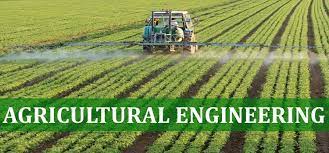‘Agricultural’ stands for harvesting and husbandry. It is the cultivation of plants for foods, medicine and bio fuel and other substance that is useful for the human life.
‘Engineering’ is the application that involves practical and scientific knowledge in term of the machine, process, invent, design, maintain, material, system, device, built and improve. “Agricultural engineering is the discipline of engineering that imparts engineering, science and technology to improve and maintain the agricultural process and production” India is one of the top agricultural countries in the whole world. Only the agricultural sector contributes around 25% of the Gross domestic product (GDP). The agricultural sector plays an important role in the Indian economy.
The student, who cleared the graduation in agriculture, is called an ‘Agriculturist’. The industries, which are depending on the agriculture for the raw material, get impacted by the agricultural condition.
An agriculturist imparts the engineering and technological law and methods to improve the production of agriculture like fruits, vegetables, medicinal plants and grains. An agriculturist also deals with the conservation of soil and water, enhancement of agricultural equipment and machinery, design and production enhancement and bio-gas development in rural area.
Agricultural engineers have much to do as increasing biological discoveries are adopted to farming practices like on-farm energy production. New uses for agricultural waste are becoming evident and crops are yielding not only food, but new byproducts. Agricultural engineers design equipment and develop methods for land preparation, planting and harvesting. They use automation, precision, and smart or “intelligence” technologies with new and existing equipment. Sensors are
used in combination with microcomputers, controllers, artificial intelligence and other software, which optimizes efficiency, sustainability, and the reliability of food, feed, fibre and fuel for the economy. Agricultural engineers improve on ways to reduce crop loss from field damage during handling, sorting, packing and processing. Warehousing of food and fibre are an important part of the agriculture industry; the agricultural engineer plans the heating, cooling, ventilation, post harvest handling, logistics and more.Agricultural engineers work with:
• Production facilities
• Food engineering and the processing of agricultural products
• The design of agricultural machinery, equipment, and agricultural structures
• The physical and chemical properties of materials used in, or produced by, agricultural production

